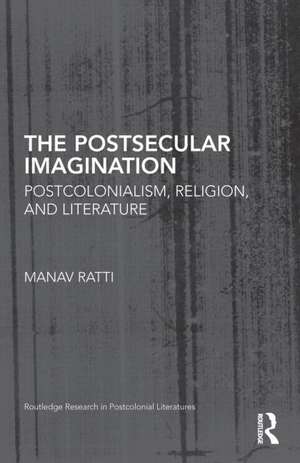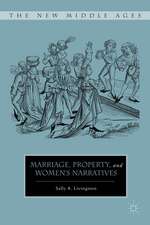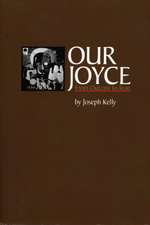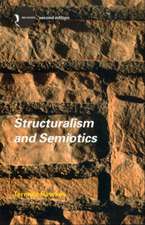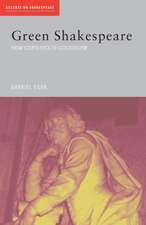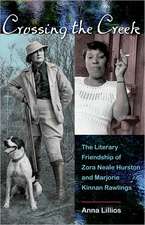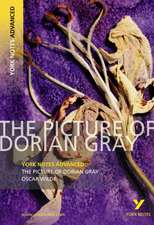The Postsecular Imagination: Postcolonialism, Religion, and Literature: Routledge Research in Postcolonial Literatures
Autor Manav Rattien Limba Engleză Hardback – 19 dec 2012
While focusing on Michael Ondaatje and Salman Rushdie, Ratti addresses the work of several other writers as well, including Shauna Singh Baldwin, Mahasweta Devi, Amitav Ghosh, and Allan Sealy. Ratti shows the extent of courage and risk involved in the radical imagination of these postsecular works, examining how writers experiment with and gesture toward the compelling paradoxes of a non-secular secularism and a non-religious religion.
Drawing on South Asian Anglophone literatures and postcolonial theory, and situating itself within the most provocative contemporary debates in secularism and religion, The Postsecular Imagination will be important for readers interested in the relations among culture, literature, theory, and politics.
| Toate formatele și edițiile | Preț | Express |
|---|---|---|
| Paperback (1) | 485.40 lei 6-8 săpt. | |
| Taylor & Francis – 10 noi 2014 | 485.40 lei 6-8 săpt. | |
| Hardback (1) | 969.71 lei 6-8 săpt. | |
| Taylor & Francis – 19 dec 2012 | 969.71 lei 6-8 săpt. |
Din seria Routledge Research in Postcolonial Literatures
-
 Preț: 311.41 lei
Preț: 311.41 lei - 9%
 Preț: 1003.54 lei
Preț: 1003.54 lei -
 Preț: 311.41 lei
Preț: 311.41 lei -
 Preț: 393.06 lei
Preț: 393.06 lei -
 Preț: 280.99 lei
Preț: 280.99 lei -
 Preț: 311.43 lei
Preț: 311.43 lei - 18%
 Preț: 1058.19 lei
Preț: 1058.19 lei -
 Preț: 344.32 lei
Preț: 344.32 lei - 18%
 Preț: 1112.65 lei
Preț: 1112.65 lei - 18%
 Preț: 1110.77 lei
Preț: 1110.77 lei - 26%
 Preț: 820.71 lei
Preț: 820.71 lei - 18%
 Preț: 1055.51 lei
Preț: 1055.51 lei - 18%
 Preț: 1005.39 lei
Preț: 1005.39 lei -
 Preț: 441.74 lei
Preț: 441.74 lei - 18%
 Preț: 1054.89 lei
Preț: 1054.89 lei - 18%
 Preț: 1112.34 lei
Preț: 1112.34 lei - 18%
 Preț: 1058.43 lei
Preț: 1058.43 lei -
 Preț: 462.81 lei
Preț: 462.81 lei -
 Preț: 463.14 lei
Preț: 463.14 lei - 18%
 Preț: 1055.32 lei
Preț: 1055.32 lei -
 Preț: 443.65 lei
Preț: 443.65 lei - 29%
 Preț: 260.33 lei
Preț: 260.33 lei - 18%
 Preț: 1054.71 lei
Preț: 1054.71 lei - 18%
 Preț: 1004.34 lei
Preț: 1004.34 lei - 18%
 Preț: 1056.63 lei
Preț: 1056.63 lei -
 Preț: 389.66 lei
Preț: 389.66 lei -
 Preț: 482.94 lei
Preț: 482.94 lei - 18%
 Preț: 1104.48 lei
Preț: 1104.48 lei - 18%
 Preț: 1114.30 lei
Preț: 1114.30 lei - 18%
 Preț: 1000.30 lei
Preț: 1000.30 lei - 18%
 Preț: 1057.09 lei
Preț: 1057.09 lei -
 Preț: 485.99 lei
Preț: 485.99 lei -
 Preț: 485.24 lei
Preț: 485.24 lei - 12%
 Preț: 339.94 lei
Preț: 339.94 lei - 18%
 Preț: 1053.16 lei
Preț: 1053.16 lei - 18%
 Preț: 1051.60 lei
Preț: 1051.60 lei -
 Preț: 384.86 lei
Preț: 384.86 lei - 18%
 Preț: 1006.77 lei
Preț: 1006.77 lei - 18%
 Preț: 1111.51 lei
Preț: 1111.51 lei - 18%
 Preț: 1007.48 lei
Preț: 1007.48 lei
Preț: 969.71 lei
Preț vechi: 1182.57 lei
-18% Nou
Puncte Express: 1455
Preț estimativ în valută:
185.56€ • 198.42$ • 154.71£
185.56€ • 198.42$ • 154.71£
Carte tipărită la comandă
Livrare economică 18 aprilie-02 mai
Preluare comenzi: 021 569.72.76
Specificații
ISBN-13: 9780415480970
ISBN-10: 0415480973
Pagini: 298
Ilustrații: 10 halftones
Dimensiuni: 152 x 229 x 20 mm
Greutate: 1.14 kg
Ediția:New.
Editura: Taylor & Francis
Colecția Routledge
Seria Routledge Research in Postcolonial Literatures
Locul publicării:Oxford, United Kingdom
ISBN-10: 0415480973
Pagini: 298
Ilustrații: 10 halftones
Dimensiuni: 152 x 229 x 20 mm
Greutate: 1.14 kg
Ediția:New.
Editura: Taylor & Francis
Colecția Routledge
Seria Routledge Research in Postcolonial Literatures
Locul publicării:Oxford, United Kingdom
Public țintă
Postgraduate and UndergraduateCuprins
Preface: The Literary and The Postsecular. Introduction: Situating Postsecularism 1. Postsecularism and Nation: Michael Ondaatje’s The English Patient 2. Minority’s Christianity: Allan Sealy’s The Everest Hotel 3. Postsecularism and Violence: Michael Ondaatje’s Anil’s Ghost 4. If Truth Were A Sikh Woman: Shauna Singh Baldwin’s What The Body Remembers 5. Postsecularism and Prophecy: Salman Rushdie’s The Satanic Verses 6. Art After the Fatwa: Salman Rushdie’s Haroun and the Sea of Stories, The Moor’s Last Sigh, Shalimar The Clown, and The Enchantress of Florence 7. The Known and The Unknowable: Amitav Ghosh’s The Hungry Tide and Mahasweta Devi’s "Pterodactyl, Puran Sahay, and Pirtha" Coda Notes References Index
Notă biografică
Manav Ratti completed his doctorate at Oxford University and is Assistant Professor of English at Salisbury University, USA. A recent faculty Fulbright Scholar at New York University, he is Fellow Designate at the Institute of Advanced Study at Jawaharlal Nehru University in New Delhi, India.
Recenzii
‘The originality of Ratti's book resides in dealing with literary works as temporal products in which secular tenets have an impact on belief systems, while still recognizing the relevance of the latter. It shares much in common with Saba Mahmood’s Politics of Piety (2005), Achilles Mbembe’s On the Postcolony (2001), and Talal Asad’s Formations of the Secular (2003). Summing Up: Recommended.’ – K.M. Kapanga, University of Richmond, USA in Choice
‘Provocative and arresting, this is a work of subtle imagination and searching intellect. It is finely written, scrupulously researched and persuasively argued—very much of the times. I look forward to what Manav Ratti next has to say.’ – Elleke Boehmer, Oxford University, UK
"The Postsecular Imagination by Manav Ratti is an important book and it has come to us at a time of great need. It is clear, concise, and full of insights that will help us navigate a world all too often polarized by cynicism and half-truths. His presentation to a full house of inquisitive minds was one of the highlights of the past number of years and we cannot say enough about Manav Ratti's charm and poise in front of an audience. The Postsecular Imagination deserves a huge audience." – Neil Wilson, Founding Director, Ottawa International Writers Festival
‘[one of] three important monographs [that] signal ... a 'post-secular' turn in postcolonial theory and criticism’ – Graham Huggan in Modern Fiction Studies
‘Ratti's text is one of the most wide-ranging studies of postsecularism with particular attention to the field of literature.’ – Anthony Paul Smith in Reading the Abrahamic Faiths
‘Manav Ratti presents a study that, far from exclusively aiming at literary criticism, tackles one of the most virulent problems of cultural policy head on: the increasingly embattled relation of secularism and religion, in some parts of the world complicated by a nationalist agenda. [...] The interpretations Ratti offers are illuminating and sensitive...the reader will feel tempted to discover the books they have not yet read themselves, a positive effect rarely produced by academic literary criticism. [...] Ideological partisanship and one-sidedness [are] gratifyingly absent from the whole book. Also, the book shows a full command of state-of-the-art literary and cultural theory.’ – Bettina Gruber in Entangled Religions
‘Provocative and arresting, this is a work of subtle imagination and searching intellect. It is finely written, scrupulously researched and persuasively argued—very much of the times. I look forward to what Manav Ratti next has to say.’ – Elleke Boehmer, Oxford University, UK
"The Postsecular Imagination by Manav Ratti is an important book and it has come to us at a time of great need. It is clear, concise, and full of insights that will help us navigate a world all too often polarized by cynicism and half-truths. His presentation to a full house of inquisitive minds was one of the highlights of the past number of years and we cannot say enough about Manav Ratti's charm and poise in front of an audience. The Postsecular Imagination deserves a huge audience." – Neil Wilson, Founding Director, Ottawa International Writers Festival
‘[one of] three important monographs [that] signal ... a 'post-secular' turn in postcolonial theory and criticism’ – Graham Huggan in Modern Fiction Studies
‘Ratti's text is one of the most wide-ranging studies of postsecularism with particular attention to the field of literature.’ – Anthony Paul Smith in Reading the Abrahamic Faiths
‘Manav Ratti presents a study that, far from exclusively aiming at literary criticism, tackles one of the most virulent problems of cultural policy head on: the increasingly embattled relation of secularism and religion, in some parts of the world complicated by a nationalist agenda. [...] The interpretations Ratti offers are illuminating and sensitive...the reader will feel tempted to discover the books they have not yet read themselves, a positive effect rarely produced by academic literary criticism. [...] Ideological partisanship and one-sidedness [are] gratifyingly absent from the whole book. Also, the book shows a full command of state-of-the-art literary and cultural theory.’ – Bettina Gruber in Entangled Religions
Descriere
This book presents a rich, interdisciplinary study of postsecularism as an affirmational political possibility emerging through the potentials and limits of both secular and religious thought. While secularism and religion can foster inspiration and creativity, they also can be linked with violence, civil war, partition, majoritarianism, and communalism, especially within the framework of the nation-state. Through close readings of novels that engage with animism, Buddhism, Christianity, Hinduism, Islam, and Sikhism, Manav Ratti examines how questions of ethics and the need for faith, awe, wonder, and enchantment can find expression and significance in the wake of such crises.
While focusing on Michael Ondaatje and Salman Rushdie, Ratti addresses the work of several other writers as well, including Shauna Singh Baldwin, Mahasweta Devi, Amitav Ghosh, and Allan Sealy. Ratti shows the extent of courage and risk involved in the radical imagination of these postsecular works, examining how writers experiment with and gesture toward the compelling paradoxes of a non-secular secularism and a non-religious religion.
Drawing on South Asian Anglophone literatures and postcolonial theory, and situating itself within the most provocative contemporary debates in secularism and religion, this book will be important for readers interested in the relations among culture, literature, theory, and politics.
While focusing on Michael Ondaatje and Salman Rushdie, Ratti addresses the work of several other writers as well, including Shauna Singh Baldwin, Mahasweta Devi, Amitav Ghosh, and Allan Sealy. Ratti shows the extent of courage and risk involved in the radical imagination of these postsecular works, examining how writers experiment with and gesture toward the compelling paradoxes of a non-secular secularism and a non-religious religion.
Drawing on South Asian Anglophone literatures and postcolonial theory, and situating itself within the most provocative contemporary debates in secularism and religion, this book will be important for readers interested in the relations among culture, literature, theory, and politics.
